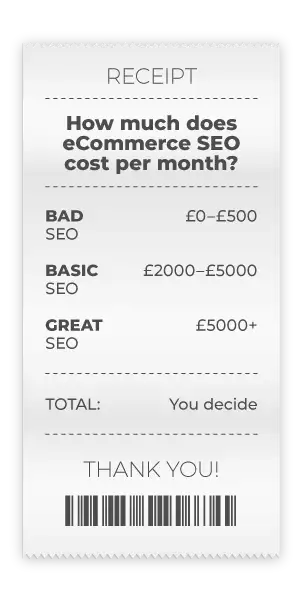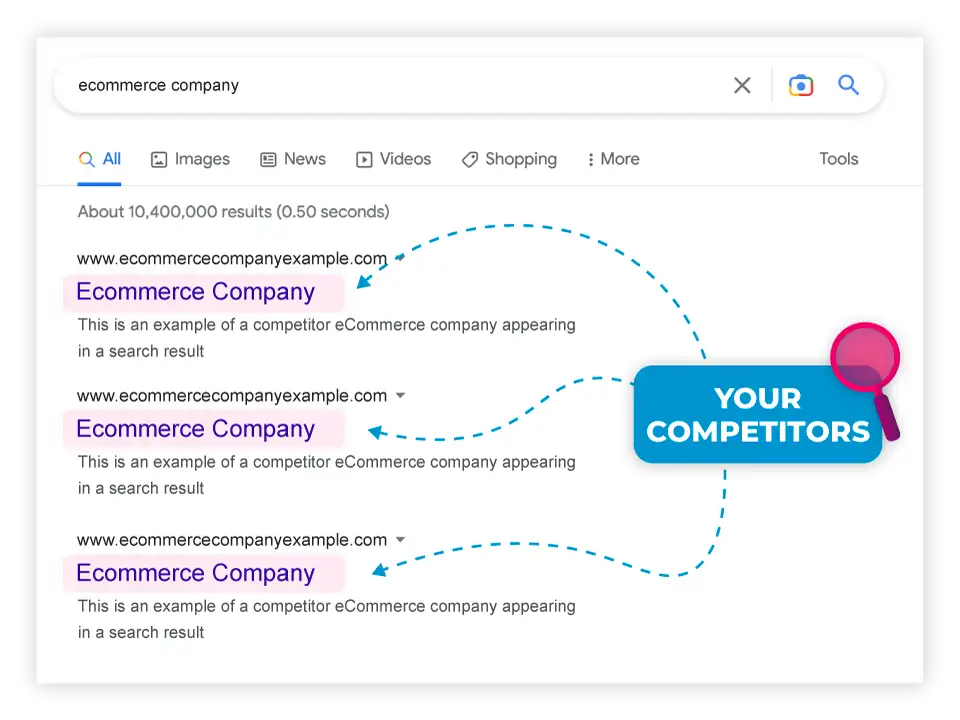
How To Choose an eCommerce SEO Agency
eCommerce businesses will struggle to get off the ground—let alone survive—without some SEO help. Some of the benefits of eCommerce SEO include:
- Drives brand awareness
- Maximises sales and revenue
- Lowers customer acquisition costs
- Builds trust with your target audience
- Compete with industry leading brands
… and that’s just the start!
So, you get it. eCommerce SEO matters and you should probably hire someone to help you do it.
Why You Need An eCommerce SEO Agency
Before you take the plunge and hire the first local company you find on Google, or the first self-proclaimed ‘expert’ who slides into your LinkedIn DMs, there are some things you should know.
The first is that eCommerce SEO isn’t child’s play. It’s one of the most complex areas of SEO and requires a high level of sector-specific knowhow.
The second is that the only thing more dangerous than no SEO is an SEO that doesn’t really know what they’re doing. And yes—this includes you trying to do it yourself, before you even think about it.
Bad SEO will...

All of this is costlier to repair than hiring the right team for the job in the first place.
To truly capitalise on the benefits of eCommerce SEO, you need a specialist eCommerce SEO agency with experience, expertise and capacity. Here’s how to go about finding one.
Read more: “Why You Shouldn’t DIY Your SEO”
How To Choose An eCommerce SEO Agency
In order to avoid hiring some bozo who’s watched a few DIY SEO videos on YouTube and thinks they’ve cracked the code, there are some green flags to look out for. These are the big, bright indicators that you’re in contact with someone with a proven track record of maximising sales and building strong, mutually beneficial client relationships in eCommerce SEO.
Case studies
SEOs market ourselves on the results we achieve for our clients. We are nothing without evidence that our methods work. No SEO worth your time is going to be lacking in case studies.
These should be easy to find—just click on the bit that says ‘case studies’ in their website navigation. Oh, it’s not there? That’s a bit of a red flag. SEOs are anything but humble about success stories, so if they’re not signposted, it’s possible that your agency of choice doesn’t have any.
It’s worth bearing in mind that while any decent SEO agency will definitely have case studies on their website, SEOs don’t have time to produce case studies for every client they work with. They should, however, be able to provide more examples of their work in the eCommerce space upon request.
Internal capacity
eCommerce SEO projects are big. The audit alone often takes weeks, if it’s being done properly, and the on-page optimisation must account for potentially thousands of pages. It’s so important that there are enough hands on deck to get the job done, or you’ll be paying a retainer for 6+ months with barely anything to show for it—no strategy, no content, no rankings. Or worse, the team working on your project will be burnt out and miserable. Bad for them, and bad for you.
This is something you can quite easily investigate, as many SEO agencies will have employee profiles in their ‘About Us’ section. If not, we’d recommend having a conversation during the discovery process about how many people will be available to work on the project, how long it will take for work to start being produced and whether any core services—such as content writing or outreach—will be outsourced.
For reference, SEO projects often take a few months to get off the ground, depending on the size of the website and how competitive the landscape is. As a general rule, the best SEO agencies do everything in-house and aim to start producing results within 3-6 months. 
Realistic price point
Not to be a broken record, but it’s hard to overstate how complex and time-consuming eCommerce SEO can be, especially if we’re dealing with a website that has thousands of pages and is in a hyper-competitive niche.
You are not going to find a cheap solution to this. You might find a cheap provider, but they won’t be the solution. And once again, the only thing more damaging to your site than no SEO is an SEO that doesn’t know what they’re doing.
If you’re serious about optimising your website and competing with the retailers currently occupying first-page positions for your target keywords, you can expect to pay £5,000+ a month for it. This is the rate for high-end, expert service from an experienced team with a varied skill set, which is what you’re going to need to get the job done.
Don’t get us wrong—there are agencies charging this that don’t fit the bill. In eCommerce SEO, high prices don’t guarantee a good service, but cheap prices guarantee a bad one.
Read more: “SEO Agency Pricing: How Much Does SEO Cost?”
Industry reputation
The SEO community is stacked. Both online and in-person, the SEO community is a big group of hundreds of geeks who love to swap success stories, horror stories, theories about algorithm changes and top tips. We’re not shy about singing the praises of other agencies and engaging with the expertise of other people. As Google doesn’t publish a full explanation of its algorithm, we need to engage with one another in order to do our jobs.
The point is: if an eCommerce SEO agency is worth knowing, other SEOs will have something good to say about them. For example, we’re known for our SEO experiments. Our research has been read by 400,000+ SEOs and cited by over 700, including by industry figureheads like Rand Fishkin, the co-founder of industry-standard SEO platforms Moz and SparkToro.
Websites that reference our work...
Top SEO agencies become top SEO agencies by contributing to the field. If your chosen agency is operating in a bubble, or is actively hostile towards the wider SEO world, they are either inexperienced or their methods have been called into question by real experts.
Questions To Ask An eCommerce SEO Agency
The discovery process of hiring an eCommerce SEO agency is an underutilised tool in filtering out the black-hats and the amateurs. Remember: they may be the experts, but they’re the ones trying to win your business. It’s their job to impress you, and that includes answering your questions. The key is knowing the right questions to ask. For example:
1. Which eCommerce CMSes do you have experience using?
eCommerce websites, more often than not, are built on specialist CMSes (content management systems). This is because they have to perform unique functions that content-based websites (such as blogs or professional services websites) don’t have to worry about, including:
-
Payment processing
-
Inventory management
-
Product filtering
-
Order fulfilment
-
Advanced site search
The most common eCommerce CMSes are BigCommerce, WooCommerce, Shopify, Squarespace and Magento. Some eCommerce websites are also built on a custom CMS.

This question will immediately separate the experts from the amateurs. If they’ve never optimised a website built on an eCommerce CMS, they are likely lying to you about having worked with eCommerce clients before.
2. Can you provide me with examples of your work in the eCommerce space?
Again, while any good SEO agency will have case studies readily available on their website, very few SEO agencies publish case studies on every client they work with.
Ideally, you want a provider to have taken on a variety of eCommerce projects—from small, independent businesses to large commercial retailers—to prove they can work flexibly and adapt to the requirements of each client.
Each area of eCommerce SEO—technical, content and link-building—is also a specialist subject. eCommerce technical SEO audits require a high level of expertise, eCommerce content marketing requires an understanding of shoppers in the client’s specific niche and eCommerce link building requires relationships with relevant journalists and publications. The examples your agency provides should therefore cover all three branches of SEO.
3. How long will the eCommerce SEO audit take?
There’s a correct answer here, and it goes something like this:
“Well, eCommerce audits generally take at least a few weeks to complete. We’ve had a preliminary look at your website and given the size, it’ll probably be [longer/shorter], but that obviously depends on how much we find.”
The reason this is approximately the right answer is that it’s impossible to accurately estimate how long an audit will take. Audits are primarily about identifying errors—if there are lots of errors to go through, it’s going to take a lot longer than if there are hardly any. Either way, an agency can’t know until they start the audit.
You want an indication that they’ve had a look at your website before speaking to you—it’s the professional thing to do, after all—but setting hard expectations about the timescale of an audit is just poor client management.
Read more: “The Beginner’s Guide To eCommerce SEO Auditing”
4. What SEO tools will be used to audit and optimise our website?
There are a few must-haves here. Any SEO agency taking on an eCommerce project needs, at minimum, an SEO stack that can do the following:
-
Crawling
-
Backlink analysis
-
Competitor analysis
-
Outreach
-
Reporting
Most commonly, this gets broken down into:
- An SEO spider, most commonly Screaming Frog
- A professional SEO software suite, such as Ahrefs or SEMrush
- A backlink checker, such as Majestic
- Google Webmaster Tools, including Analytics, Tag Manager and Search Console
SEO agencies might also use free audience research tools like Answer The Public or AlsoAsked and PR tools like Gorkana or HARO, among others.
Unfortunately, you can’t execute a full eCommerce SEO strategy using just one or two tools. Again, each branch of SEO is its own specialism and comes with its own tools. Whatever tools your eCommerce SEO agency prefers, they should have a diverse SEO stack covering all their bases.
5. What are some examples of eCommerce sites you think do SEO well?
You might catch some people off-guard with this one, and that’s okay! But generally, SEO agencies should do a bit of research into their client’s niche before jumping on the discovery call. Competitor analysis is a big part of what we do, as the algorithm rewards the sites with the strongest SEO. The search engine results page (SERP) is therefore a how-to guide for how to succeed for each keyword.

That’s not to say that your SEO agency should suggest outright copying a competitor, but it’s handy if they’ve done their research to identify some brands who have interesting or innovative approaches. These could be used during the project both for competitor and content gap analyses to measure the ongoing success of the SEO strategy against.
6. How do you identify outreach targets?
Oof, okay.
Link-building is easily the most controversial area of SEO. Backlinks—links from another website pointing towards your own—are the foundation of how Google became the biggest search engine in the world. Google’s theory is: the more backlinks a site has, the more trustworthy it is. It’s a bit like word of mouth: if ten people you trust tell you that the same restaurant is the best pasta place in town, you’re going to believe them. Websites linking to others are seen as recommending that site to Google.
Of course, like any well-intentioned system, there have been plenty of people attempting to game their way to the top, often by bulk-buying links from low-quality websites. If you’ve ever been messaged by someone promising to build you thousands of backlinks in a month or two, this is probably what they’re doing.
But Google is smarter than these people think it is. It has worked very hard to identify and penalise this behaviour. It wants links that are natural and relevant, above all else.
Our preferred method of link-building is digital PR, which involves curating an eye-catching campaign for our clients with a unique dataset, emailing it out to journalists who then write up the story in their publications—which also happen to be some of the most trusted and authoritative sites on the web!
Guest blogging (publishing an article containing a link to your site on somebody else’s website) is another common method of link-building, and is effective as long as you stick to those two golden principles—natural and relevant—and publish on high-quality websites.
If your eCommerce SEO agency is promising a ton of links, but isn’t particularly selective about the ‘who’ and the ‘how’, bin them.
Acquiring toxic backlinks is the quickest and easiest way of landing yourself in Google’s bad books.
7. How long will it take to see results?
Something to remember when hiring an eCommerce SEO agency—if it sounds too good to be true, it probably is.
There are agencies out there that will promise you first-page rankings within a certain timeframe, and we wouldn’t blame you for hiring them. After all, if one agency is saying “three to six months” and another is saying “a matter of weeks”, who wouldn’t opt for the second option?
The trouble is, when done right, SEO is a cycle of consistent and sustainable growth. Like anything else in life, there are no shortcuts to the very best result—just time, commitment and hard work.
You can achieve short-term boosts in traffic from black hat SEO tactics. No one is denying that. But black hats don’t tell you what happens next—Google gets wind of your tactics and penalises you for them.
If you want SEO that pays for itself ten times over, brings relevant and high-converting traffic to your site and secures you a first-page position on search results alongside your most prominent competitors, you can expect to wait 3-6 months for initial results and continue working with your eCommerce SEO agency over the long term.
8. How do you measure the success of your eCommerce SEO campaigns?
This one’s easy. If they just say “rankings”, they’re not the one.
Rankings is an obvious metric to track—SEO is all about ranking on the first page for target keywords, right? Top eCommerce SEO agencies will of course track rankings as a performance metric, but that’s not all. Experienced SEOs will know to track a variety of metrics in order to continually grow and sustain your organic traffic, and ensure it’s coming from the right sources.
![]()
After all, SEOs aren’t the only ones tracking user behaviour. Google also tracks user behaviour as an indicator of how effectively a page is meeting the user’s search intent. Are they clicking through to other pages after clicking on the organic result? Are they scrolling all the way down the page? Are they having to perform other searches to get their desired information? All of these metrics can impact your rankings.
For this reason, top SEO agencies track rankings, traffic and conversions as well as scroll depth, bounce rate, backlinks, domain authority, average session duration, pages per session, micro and macro conversions and ROI to paint a full picture of your website’s performance.
Read more: “SEO KPIs the best SEOs will track”
9. What access do you need to our site?
To do the technical SEO audit alone, your agency will need access to your Google Webmaster Tools, which includes Search Console, Analytics and Tag Manager. Ideally, you should already have this set up, but if not, your SEO agency will set it up for you right at the start of the project.
Additionally, there’s usually a conversation to be had about who will be responsible for implementing changes on your site. Some companies prefer SEOs to handle the entire process—including uploading content and making technical changes, especially if the agency has an in-house developer.
With larger eCommerce businesses, there is generally a technical team in place already who may be capable of handling the agency’s recommendations themselves. The work will be more collaborative and the eCommerce SEO agency will therefore need less access.
The level of access therefore depends on the size and internal capabilities of each party involved—you and the agency—but SEO agencies will need some access to your site in order to complete the project.
10. Are there any recent changes in SEO that affect eCommerce sites?
We love this question. We love it when clients ask this question, and we love being asked it.
Why do we love it? Because we can answer it.
SEO is a constantly evolving landscape. Google makes thousands of changes to its algorithm every year. The majority of these aren’t announced, but the ones that are give us crucial clues as to what it is working towards.
For example, the words “expertise, authoritativeness and trustworthiness” or E-A-T have popped up in pretty much every Google update over the last couple of years. A couple of ways that E-A-T has manifested in Google updates include the Product Reviews Update and ongoing changes to the Merchant Center.
If you’re involved in the online SEO community, these updates are almost impossible to miss. We obsess over algorithm changes and try to decode how they’re going to affect our clients.
So if your potential eCommerce SEO agency can’t think of an answer to this question, they’re probably not paying attention or they use the same formulaic SEO process for every client. Either way, it’s a big no-no.
Hire Reboot
Reboot Online Marketing is an eCommerce SEO agency with a track record of maximising sales for our online retail clients. We have worked with businesses in a wide variety of niches—from sports equipment to online marketplaces, home furnishings and more—, deploying a wide range of expertise across content marketing, technical SEO and digital PR to drive relevant organic traffic to both top-level and inner category pages.
